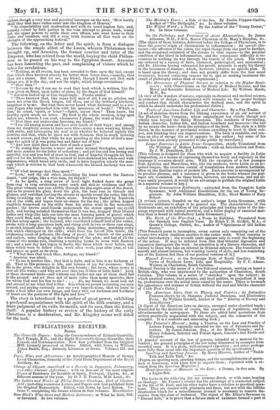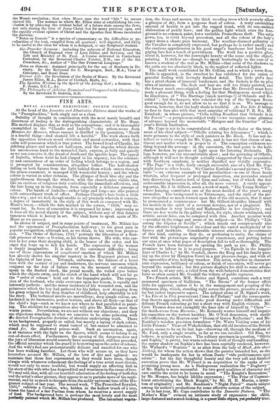PUBLICATIONS RECEIVED.
Booxs.
The Grenville Papers: being the Correspondence of Richard Grenville, Earl Temple, K.G., and the Right Honourable George Grenville, their Friends and Contemporaries. Now first published from the Ori,ginal MSS. formerly preserved at Stowe. Edited, with Notes, by William James Smith, Esq., formerly Librarian at Stowe. Volumes III. and IV.
Peace, War, and Adventures : an Autobiographical Memoir of George Laval-Chesterton, formerly of the Field Train Department of the Royal Artillery, &c.
Change of Climate considered as a Remedy in Dyspeptic, Palmonary, and other Chronic Affections: with an Account of the most eligible Places of Residence for Invalids in Spain, Portugal, Algeria, &c., at different seasons of the year. By 1). J. T. Francis, M.D. Lond.,
The Letters and Works of Philip Dormer Stanhope, Earl of Chester- field ;inclading nunierous Letters and Papers now first published from the Original Manuscripts. Edited, with Notes, by Lord Mahon. Vo- lume V. completing the former edition in four volumes. Miscellanies.
Sam Slick's Wise Saws and Modern Instances; or What he Said, Did, or Invented. In two 'volumes. , , The Maiden's Tower; a Tale of the Sea. By Emilie Flygare-Carlan, Author of "The Birthright," &a. In three volumes. The Wilful Ward ; a Novel. By the Author of the "Young Doctor," &c. In three volumes.
On the Pathology and Treatment of Acute Rheumatism. By James
Alderson, M.D., F.R.S., Senior Physician of St. Mary's Hospital, &c. [The object of these lectures, delivered before the College of Physicians is to trace the general origin of rheumatism to inflammation ; its specific cha- racter—the affection of the joints, the rapid change from one part to another, and the occasional extension of the disease to vital organs—to the peculiar condition of the blood in inflammation, and the consequent difficulty it en- counters in working its way through the vessels of the joints. The views are enforced by a variety of facts, chemical, pathological, and anatomical; and Dr. Alderson having exhausted his proofs, proceeds to apply his theory to the treatment of disease ; which, however, involves no specific plan. It is based upon the theory ; and does not greatly differ from the best usual treatment, beyond rendering reasons for it, and so making treatment the result of philosophy rather than of experiment.]
The Harmonies of Physical Science in relation to the Higher Senti- ments ; with Observations on the Study of Medical Science and the Moral and Scientific Relations of Medical Life. By William Hinds, M.D., Arc.
[A view of the wonders of nature, especially in chemical and medical science, as evidences of design ; accompanied with remarks on the proper feelings and conduct that should characterize the medical man, and the spirit in which he should undertake his professional duties.]
Traits of American-Indian Life and Character. By a Fur-Trader. [A set of sketches drawn from the lifelong experience of an old servant of the Hudson's Bay Company, whose employment has chiefly though not wholly lain beyond the Rocky Mountains. The incidents of fur-trading, Indian character, Indian life, and Indian treachery and massacre—the last by no means the least—form the substance of the book. The style is a little forced, in the manner of provincial writers unwilling to trust to their sub- ject, and thinking they can improve nature. The book is readable, and con- veys an idea of savage life as it appears to the author ; but some of his matter has been already presented to the public by travellers.] Longer Exercises in Latin Prose Composition, chiefly Translated from the Writings of Modern Latinists ; with an Introduction and Notes. By J. W. Donaldson, D.D.
[This volume is designed for those who wish to acquire a facility in Latin composition, as a means of expressing themselves freely and copiously in the language if occasion should arise. With the exception of a few passages from Apuleius and Macrobius, who, like the moderns, wrote Latin as an ac- quired tongue, the exercises consist of translations from modern Latinists, often on the familiar topics of modern life. Each exercise is accompanied by its peculiar phrases, and a reference is given to the books whence the pas- sages are translated. As these books, however, are numerous, and not al- ways easily procured, it would be an advantage to publish the original Latin in a separate volume or key.]
_Latino Grammatice .Rudimenta :.extracted from the Complete Latin Grammar, with Additional Elucidations for the use of Young Be- ginners. By John William Donaldson, D.D., Head Master of Bury School.
[A revised extract, founded on the author's larger Latin Grammar, with necessary additions to adapt it to general use. The characteristics of the Rudiments are an exhibition of the principles and leading rule/ of the lan- guage expressed with logical precision, and a fuller display of essential mat- tersAhan is found in introductory Latin Grammars.] The Birth of the War-God; a Poem by Kfilidasa. Translated from the Sanskrit into English Verse. By Ralph T. H. Griffith, M.A., of Queen's College, Oxford, &c., Author of "Specimens of Old Indian Poetry."
[This Sanskrit poem is incomplete, seven cantos only remaining out of the twenty-two which tradition ascribes to the entire work. What remains is rather introductory ; the seventh canto appears only to reach the beginning of the action. It may be inferred from this that Oriental digression and expansion distinguish the work : its attraction is of a literary character, and limited to those who take an interest in Oriental subjects. The translation is smooth and almost luscious, but wanting variety of style, and less reminding one of the Eastern Ind than of our poetical versions of it.] Manuel Pereira ; or the Sovereign Rule of South Carolina. With Views of Southern Laws, Life, and Hospitality. By F. C. Adams. Written in Charleston, South Carolina.
[Manuel Pereira is the name of a free Coloured seaman, serving on board a British ship, who was imprisoned by the authorities of Charleston, South Carolina. This volume is a series of "sketches" upon the subject; in which nautical scenes, local persons, and local politics, or prejudices it may
i
be, predominate over the actual issue raised by the name. -There is too much the appearance and manner of fiction without the real and lifelike character of Uncle Tom's Cabin.]
The American Slave Code in Theory and Practice ; its distinctive Features shown by its Statutes, Judicial Decisions, and Illustrative Facts. By William Goodell, Author of the "History of Slavery and Auti-Slavery." [A digest of the American laws on slavery, arranged under classified heads ; illustrated by the decisions of courts, the speeches of legislators, and the advertisements in newspapers. To these are added brief quotations from writers practically acquainted with the subject, and the comments of the compiler. It is a readable and interesting book.] The Patentee's Manual ; being a Treatise on the Law and Practice of Letters Patent, especially intended for the use of Patentees and In- ventors. By James Johnson, Esq. of the Middle Temple ; arid J. Henry Johnson, Solicitor and Patent Agent, Lincoln's Inn Fields and Glasgow.
[A. popular account of the law of patents, intended as a manual for in- ventors; the general principles of the law being illustrated by examples from recorded cases. It is a plain, well-arranged exposition ; and enters perhaps. more fully than usual into the important question of the specification.]
Sporting and Sporting Fancies. By Harry Hieover, Author of "Stable Talk and Table Talk," &o.
[Papers on sporting men, sporting doings, and the accomplishments of sports- men or horsemen, with hints how to acquire them; reprinted with a re- vision from the Sporting Magazine.] Head-Quarters, or Manners in the East ; a Drama, in five acts. By a Light-Bob.
The books in the following list are sermons direct, or with some bearing on theology. Mr. Forster's volume has the advantage of a connected subject in the life of St. Paul, and his other topics have a relation to practical ques- tions. They are treated with plainness and force, but not with the lifelike illustration which for a miscellaneous journal is necessary to remove dis- courses from the class of technical. The object of Mr. Ellice's Sermons on "Eternal Life," is to prove that a future state of existence formed a part of the Mosaic revelation ; that when Moses uses the word "life" be means eternal life. The manner in which Mr. Ellice aims at establishing his con- clusion is by adducing the evident belief of a future state among the Jews, not only during the time of Jesus Christ but for many previous ages, and the equally evident opinion of Christ and the Apostles that Moses inculcated the doctrine.
"Notes on Genesis" is a epecies of commentary on the difficulties or pe- culiarities of the text, compiled from all quarters ; well digested, and likely to be useful to the class for whom it is designed, or any Scriptural student. Biz-Preacher Sermons : including the subjects of National Education, the Church of England view of Lent Duties and Services, and the Life and Ministry of St. Paul. A Course delivered in Canterbury Cathedral, by the Reverend Charles Forster, B.D., one of the Six Preachers, &c., Author of "The One Primeval Language." Notes on Genesis: designed principally for the use of Students in Di- vinity. By the Reverend Sir C. Macgregor, Bart., M.A., Vicar of Cabourne, and Rural Dean.
Eternal Life: the Revelation of the Books of Moses. By the Reverend James Ellice, M.A., Rector of Clothall, Harts, &e. The Epistles Written by the Spirit of the Living God; a Sermon. By F. Jeune, D.C.L., &c. The Philosophy of Atheism Examined and Compared with Christianity. By the Reverend B. Godwin, D.D.



























 Previous page
Previous page